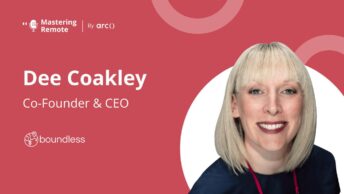Today on the show we have Hiten Shah, founder and CEO of FYI. Hiten was also the founder of tech startups like Kissmetrics, Crazy Egg, and Quick Sprout. We talked about how Hiten has been leading remote teams since 2003, FYI’s Remote Work report, the importance of figuring out your remote work structure, and why hiring is about “opting-in.”
An interesting theme in this interview is Hiten’s core message: “Figure out what works for you.” You can easily find articles about remote work best practices, remote work management, and so on. However, Hiten strongly recommends that you figure it out yourself. If your personality, management style, and team structure are not ideal for remote work, admit it and find a solution that works for you.
If you’re enjoying the podcast, please consider leaving a review on iTunes!
The podcast is also available on your favourite players: iTunes, Google Podcast, Castro, Overcast, Spotify, Stitcher, Player.fm, and Tune In.
Follow us on Twitter to get updates.
Looking for top talent fast? See how Arc can help you:
⚡️ Find developers, designers, marketers, and more
⚡️ Freelance or full-time remote + fully vetted
⚡️ Save up to 80% with global hires
Hire top talent with Arc risk-free →
Topics also covered on the podcast episode:
- 2:27 — How Hiten Shah started his very early internet business
- 4:00 — Why Hiten and his co-founder Marie Prokopets wrote the Remote Work Report
- 6:10 — The most surprising finding from the Remote Work Report
- 8:10 — How a remote manager can help remote team members figure out their ideal daily structure
- 10:10 — What exactly is “overcommunicating”?
- 12:37 — Why understanding people is the most important challenge remote companies need to tackle
- 14:00 — Hiten’s hiring process, and the biggest differences in hiring remotely between then and now
- 24:00 — Questions people should ask themselves when they’re building a remote team
- 29:09 — Where Hiten usually does his best work
Mentioned resources:
- FYI
- Kissmetrics
- Crazy Egg
- Quick Sprout
- The Remote Work Report
- The Startup Chat Podcast
- The Remote Show Podcast episode with Hiten Shah
- Notion
- Marie Prokopets
- 11 Best Practices for Working Remotely
- 58 Must-Read Remote Work Resources
- Automattic
- Buffer
- How To Build Social Connections and Trust in Remote Teams with Claire Lew
- Why Hiring Outside Silicon Valley is the New Normal with Andreas Klinger
- Hiten’s Twitter
Full transcript:
Jovian: Hello, world. Welcome to another episode of “Outside The Valley,” podcast where we interview remote startup leaders, remote workers and companies who thrive outside of Silicon Valley. This is a podcast where remote companies share what works and what doesn’t, so you can do it right. “Outside The Valley” is brought to you by Arc, A-R-C, the remote hiring platform that helps you to hire remote software engineers and teams easily. I’m your host for today, Jovian Gautama.
Today, on the show we have Hiten Shah, the Founder and CEO of FYI. For some of you, Hiten might not need more introduction. He is a very experienced startup founder and product expert that has been running startups since 2003. He’s also the founder of tech start-ups like Kissmetrics, Crazy Egg and Quick Sprout. We talked about how Hiten has been leading remote teams since…out of college when he started his first business.
We also talked about “The Remote Work Report” that is written by Hiten and his co-founder Marie Prokopets. The importance of figuring out your remote work structure and why hiring is about opting in. An interesting theme in this interview is Hiten’s core message, actually, which is, you have to figure out what works for you. I mean, today you can easily find articles about remote work best practices, remote work management including this podcast, actually. It’s a resource for you to lead remote teams better.
However, Hiten strongly recommends you to figure it out yourself. Just like if you’re a startup founder or a product guy, strive to figure out what’s best for your customers and for your product. If your personality, management style, and team structure are currently not suitable for remote work, admit it and try to find a solution that works for you and if you still want to build a remote team, try to figure out what you can improve. So, without further ado, here is today’s episode with Hiten Shah. Hello, Hiten, welcome to the show.
Hiten: Thanks for having me.
Jovian: I’d love to start this podcast with your entrepreneurial journey, like, how did you start your first company and so on?
Hiten: Sure. I started my first company, which was a consulting company back in 2003 and I started it because I was getting out of college and my co-founder now brother-in-law was getting into college and he had one customer paying him $3,500 a month to do SEO. So, we started a consulting business doing SEO at the time and that’s where I got to learn a lot about online marketing. And within the first year, we decided to start building products and that’s when Crazy Egg came up. After building about a dozen products, we realized that we can…we got lucky with that one. But the real key was that we wanted to diversify from doing consulting into something that’s more repeatable and scalable and subscription software as a service businesses were very early at the time. This ended up being about 2005, ’04 and ’05 is when we really started building software and we just went all in on that.
Jovian: That’s great because from my research, as far as I know, that you’ve actually when it comes to remote hiring, you’ve been working remotely so to speak since that time, right, 2003? You’ve been hiring, I assume, like, freelancers around that time. So, it feels like remote work is just like work to you, so to speak, in the sense, like, the future for it is actually the past for you. A heck of a good quote, I should use that. So, yeah. Before we move on to that, so, I want to talk a bit more about “The Remote Work Report” that you’ve just published recently. Can you share a bit more about what’s the motivation of you guys writing this report?
Hiten: We looked around and we know there’s a lot of, like, state of remote work and other types of reports that have been written in the past and we really like to do things differently. And the way we do research, just like we do product research is not the same as other people do where they are asking a lot of multiple-choice questions and things like that. What we do is we actually ask open-ended questions like, “What’s your number one challenge with remote work?” And we actually read every single response and analyze the results. So, our approach is different and our approach gets us really people’s language and exact words they use for these things. So, we decided to use that strategy and that approach to get as much learnings as we could about remote work and how people feel about it.
We also went on Twitter and started asking a bunch of questions about remote work as well. We also used it to verify some of our data. One of the pieces of data we wanted to verify was in our research report, people said in our survey people said 60% of the people, actually 60% of the people who were surveyed, they said they work remotely 100% of the time. So, on Twitter, I asked, “Do you work remotely?” Yes, no, or no, people on my team do. And it turns out 62% said they work remotely. So, it’s exactly what I was thinking in terms of…not exactly what I was thinking, it’s exactly the data we got back. So, this ended up being 40,000 pixels long in terms of the report and the design of it. And it’s gotten, you know, lots of traffic and lots of eyeballs and people keep sharing it. And it seems to be something that people like.
We also included pet photos, we included embarrassing moments remote working and we also included what people appreciate about remote work because we did a bunch of tweets around asking people a bunch of stuff about remote, including what do they appreciate the most and that got a pretty huge response. And then we also, so I got some pictures of remote work set-ups. And then we even went further and there’s this whole directory of tips on remote work. And if anyone wants to see this that’s listening it’s at bit.ly/remotereport and you’ll be able to get to it and see the whole report that we’re talking about.
Jovian: Yeah, yeah. We’ll put this on the show notes. So, what are the most surprising results or findings that you find in this report itself?
Hiten: Yeah, I think that a high-level, like, answer that we got when we asked these questions, was basically everyone loves remote work.
The two surprising things were 91% of people who work remotely said it’s a good fit for them, 96% said that they would recommend working remotely to a friend. So, the most surprising thing was, like, how much people actually love it. And contrast to that, it’s how much people love it despite the different challenges that people have with remote work.
So, the number one challenge people have, which is obvious, which is what 27% of our respondents said was communication and then 16% said social opportunities, 13% said loneliness and isolation. So, those top three things really hit on basically the key challenges that people have, which all has to do with this feeling of being alone, finding it hard to communicate, and literally almost being desperate to find opportunities to make connection in the workplace in a way that they can’t anymore because they’re working remotely.
Jovian: In your report, at the end of your report, this is one conclusion that actually, I found it super interesting is basically you mentioned that, and I’m quoting here is we haven’t figured out how to deal with ourselves. So, before this podcast I was actually doing some research about you and your opinions about remote work and I bumped into this Startup Chat podcast with you and your friend Steli Efti from close.com. By the way, if you’re listening to this, you should listen to the podcast. It’s a great podcast. They have, like, 400-something episodes now. This is what I do in my podcast, just promote other podcasts, by the way.
Hiten: Cool. It’s called “The Startup Chat,” thestartupchat.com.
Jovian: Thestartupchat.com. Listen to that. So, yeah, this is episode, is actually kind of an old one, like episode 181 or something like that. And I guess it’s the theme about figuring a structure. So, I was wondering if I look back and to conclusions in that episode itself. So, basically, it’s the whole themes about figuring out a structure. So, I’m wondering your opinion like as a company, either you’re partly remote or fully remote, what can, like, CEOs or founders or the management level do to help employees figure out structure?
Hiten: Yeah, I think it’s just about how a manager is paying attention to the team members and making…this could be founders if, you know, you’re kind of less on the manager side and more a smaller company and really just figuring out, like, helping people understand what they need to succeed with remote work.
You know, what do they need? Do they need to go to a coworking space? Do they prefer that? Do they need advice on how to deal with other people? Right? So, this is about communication and the social aspects. Do they need guidance on how to communicate better in a remote environment where a lot of the communication is text in terms of Slack or something like that as well as like documentation?
So, it’s really just about knowing the importance of communication and process and documentation on remote work and then doubling down on the fact that people on the team need help with it. So, I don’t like to make this complicated. I don’t like to provide a lot of structure. What I do like to do is pay attention to individual team members and their needs.
Jovian: Right. That’s interesting because when it comes to individual and their needs, so, another theme that I bumped into a lot when it comes to…and it’s still related to the biggest challenge on “The Remote Work Report” is that when it comes to communication, it’s mentioned a lot of times to the point that I feel, I personally feel it kind of lost meaning, okay. How to solve the…okay, communications. And how to solve this X problem, “Oh, you just need to over-communicate.” We say over-communicate a lot, but in your experience or in your opinion, what is over-communicating? What actionable steps that one can do to overcommunicate?
Hiten: Yeah, I think you should err on the side of over-communicating. So, you should repeat the things you say, you should…actually, if you’re in meetings, you should make it absolutely clear what the next steps are after the meeting. You should definitely confirm things via email after if you need to if you really wanna make sure that things are clear with the team. And I think, like, that repetition, that clarity…like, a lot of times I’ll say, “To clarify…” and then I’ll say what I mean or I’ll say, “Hey, can we make sure that we heard the same thing on this call?” I write a lot of notes. I do all those kinds of things and that’s really the best you can do. That’s really helpful when it comes to remote work to make sure that you’re reiterating things, repeating things, clarifying things, making sure everyone’s on the same page.
Jovian: Yeah, I think it gets back to the process again. So, one phenomenon that I saw recently is, like, there is a rise of different kinds of remote tools, right? Any kind of tools that helps you, makes your remote team productive. But I feel like there’s the downside of that is that, you know, as a startup founder or even like startup people in general, you don’t have to be a founder, marketers, developers you have this like shiny new thing syndrome, right? Hey, this tool is cool. We should use this for our communication. Like, and I feel like that’s now how does it…before it was just only your product or sales or marketing, but now it’s more like it came to the team productivity area. So, hey, let’s use the tool to do our internal communication or let’s use Notion for example. But again, no one, wants to figure out the time how to build a process in Notion. So, my next question would be, like, because we talked about the challenges, but I want to ask about you personally. For you personally, what is the biggest challenge of remote work when it comes to the first one in your personal life and the second one, the team management?
Hiten: In terms of, like, what’s most challenging?
Jovian: Yes.
Hiten: Is what you’re thinking. I think, like, I don’t really have that many remote work challenges at this point beyond making sure that people on the team are very suitable for remote work. And if they’re not suitable, then you know, we make that very clear to them. I think anyone’s suitable, but it really depends on their mindset and how we can support them and how they start basically using the freedom they have with remote work to their advantage, whether it’s in their personal lives or based on, like, the way they want to work and those sorts of things.
So, I think it’s really important to really focus on individual people and their needs because everyone has a different communication style. Everyone has a different set of needs when it comes to what gives them energy, what doesn’t give them energy and what sort of drains their energy, etc.
So, I think those kinds of things are really, really important more than me thinking I’m challenged with anything. So, to me, the number one challenge is really making the team healthy. But I’ve been doing this for 16 years, so the challenges aren’t personal and mine. They’re more so challenges that relate to being able to lead a team, manage people, do all the things that you need to do to make the business successful on a remote team.
Jovian: So, I want to talk a bit about hiring remote team members. Can you share a bit more of your process when you’re hiring someone remotely nowadays versus back then? Like, is there any…what’s the biggest difference in that way?
Hiten: The biggest difference is almost like the biggest similarity. So, the biggest difference is that, you know, when you’re hiring someone, you want to evaluate whether there’ll be a good fit or not. And so, you’d find ways to do that in the past. Sometimes you just hire them because you just had to because they weren’t used to remote work so you couldn’t tell. So, you want it so that…what hasn’t changed is the fact that you want to evaluate them. What has changed is your ability to evaluate them before you hire them.
So, freelancing, side gigs, working while you have a full-time job and all that kind of stuff, that wasn’t as prominent and prevalent back in the day. But because of remote work, because of things like Upwork and all those kinds of services and the fact that we have the internet now and we have Slack and ways to communicate, I would say that it’s much easier to evaluate someone, have them actually do work with you without having to hire them full-time.
Jovian: Can you share a bit about your own hiring process now? So, let’s say you’re hiring a developer tomorrow.
Hiten: Yeah. Typically, we’re just spending a lot of time, in the beginning, making sure that they understand how our team works and that they’re okay with the way we work. And so, we’re asking a lot of questions around that, helping expose them to how we work, making them sort of feel like they’re either opting into it or opting out of it, especially with remote work where for us there’s a lot more process around how they need to do engineering. We really focus in on making sure that we get accurate timelines for things and when they ship to customers and we make sure that we have a process that helps engineers learn how to provide accurate timelines.
Those kinds of things are really what make the difference between how we think about sort of hiring and the person and how they might think about working with us.
So, the difference here is, like, we want them to opt into our environment and that’s really the most important thing. And that’s, I think the most important thing on a remote team. So, we want to expose themselves…or expose them to that sort of way of working that we have in our company. And I think for remote teams this is way more important than anything else.
Jovian: Right. Yeah, that makes sense. So, going back a couple of years ago, like 2016, back to “The Startup Chat” podcast, everyone listen to that, episode 92. So, I’m being very specific on this. So, at that time it was slightly different world back then, in internet years, you know, it was ages ago. I remember Steli Efti was talking about they just starting close.com to be a remote company. And at that time you were already working remotely of course, but at that time you mentioned your opinion on that is, “I don’t wish remote upon anybody.” So, what was the difference between your opinion back then about remote work and your opinion now? If there is any…
Hiten: My opinion hasn’t changed.
I think there’s so much about remote work that makes getting work done harder to do. And that’s the fundamental difference between remote work and non-remote work, which is work is harder to get done. You don’t get to go walk to someone’s desk and talk to them. You don’t get to have, like, a lack of process and accountability like you might own a team where you’re all sitting at the same sort of desk or in the same area and able to talk to each other. You don’t get that, you don’t get that unless you’re really spending a lot of time and energy around your processes and how people work and really defining the way the whole company operates and the way it works.
And I think that’s like the biggest difference and it’s such a big game-changer when it comes to how people think about remote work and the game-changer there is simply, we’re not used to it.
As humans we’re just not used to it. Like, think about it, if the number one challenge is communication, we’re not used to it. And like you said, like, people are coming up with all these different tools that they want to use and they make it all about the tools.
I think it’s more about getting work done. Not about the tools.
So, I focus much more and we do on our teams on, like, what are we looking to accomplish, how are we going to be able to accomplish that? And that’s the primary objective. Less so, oh, what tool do we need to use?
Jovian: Honestly, like, even here in Arc, there are a lot of things that we’re still figuring out. Like, for example, we are actually a hybrid team, some team members are co-located and some of them are distributed and sometimes even for the co-located teams, it’s hard to find documents, which I probably should promote FYI to them. But yes, I mean, there’s a lot of problems that remote teams face, which is actually just like co-located teams also face at the same time. So, it’s really about, like you mentioned, just like getting work done, getting shit done and just get your process work altogether. And I want to just dive into a bit about yourself as a startup player. So, what interests me, I’ve been following your Twitter, I’ve been following your writings for a while and you are a prolific writer and just to move away from the topic of remote work or business in general. Can you share a bit more, like, were you always interested in writing since you were young or…
Hiten: I was always interested in communication and I think writing is one key form of communication. So, to me, the interest was more about communication, how people speak to each other, how you communicate with other people, whether it’s one-to-one, one-to-many or even many-to-many and those kind of environments. I even studied organizational behavior during undergrad. I only went to undergrad. And so, it was just something about the way people work, the way humans interact. I think a lot of that has to do with communication and it’s just something that’s been a topic I really care about. A lot of that has to do with like understanding people’s context asking really great questions and a lot of, like, sort of things like that.
Jovian: Right. So, yeah, the reason why I brought this up because I’ve talked to several CEOs and startup leaders and apparently Claire Lew, the CEO of Know Your Team. One of the key traits that she mentioned on a good remote leader is writing. They have to be a great writer. So, I was thinking, like, does your love for writing, do you feel like it shapes your leadership or management style in one way or another? Because your love for communications and for concise writing, do you think it shapes you?
Hiten: I think it does. I really value people who can clearly communicate. It doesn’t matter what level in the company they are. I think clarity of communication and people who are looking to improve the way that they interact with other people, those things are fairly important to me.
Jovian: How can someone be a better communicator? Especially when it’s set in the circumstances of remote work?
Hiten: Whatever your leadership style is and your communication style is, the more clearly you can understand yourself, and what you prefer and how you prefer other people communicating with you, I think the better.
For example, in my case, if I have a direct report, I want them to own the one-on-one meetings we have. I want them to determine the agenda. I want them to write down what they want to talk about and that’s how I like to do it. I might have my own thoughts and ideas, but I want them to own the document because we use a document for that, that’s like just updated every one-on-one and it’s their job. It’s literally their job to figure out what they want to talk about because it’s their work, they own their work.
I don’t own their work. It’s not my job to do their work. It doesn’t benefit me when they do their work, it might benefit the business, but it doesn’t benefit me personally. So, I really think about it like giving people ownership over things that they should own and that’s really important. I would say that that’s like one big piece of advice I have, which is like, do you prefer that or do you prefer making the agenda for your one-on-ones? It’s totally fine, but make sure that the people that you’re working with understand those things about you.
Jovian: So, I think, another thing about remote work itself, even though that we’ve been talking about, you know, hiring someone you can trust and so on, but there are still startup founders, like, in my opinion, even though they believe, oh, yeah, I know remote work works. I know that a lot of big companies are doing that. But a lot of startups find that they cannot get rid of the trust because they still have this, some kind of a “paranoia” is probably too strong of a word, but they just feel like, okay, what if things don’t get done? And these people are actually those people that they want to try remote work itself.
Like, okay, I am co-located now, but I want to start creating a remote team for whatever reason, right? Either for more talents or for giving more flexibility simply, but they just find difficulties either on the trust part on their end or communication part. What questions do you think these people should ask themselves when it comes to building a remote team from scratch?
Hiten: So, if someone’s trying to build a remote team from scratch and they’re starting from zero?
Jovian: Yeah, right, starting from zero or they already have a co-located team now and just want to try out having remote teams or hiring remotely.
Hiten: Yeah, I think that’s an important use case that we’re going to see more and more companies struggle with. The reason is if you’re not remote, all the things that happen in the office, many of them you need to duplicate on your remote team. But how do you do that? That’s the real question. I think that’s what makes it really tough for many people to figure this problem out.
Jovian: Right. Do you feel like in the future there’ll be some, like, specific roles inside the company that will help figuring things out? Well, not necessarily in terms of remote work, but, like, internal communications. Like…
Hiten: I think it’s possible. I would hope we don’t need that.
Jovian: Right. Yeah, that makes sense. Because, I think a lot of founders, I mean in my opinion, a lot of founders I think are still kind of struggling around this a bit, because a lot of founders, I think a lot of them are, I don’t know product people, they just want to ship stuff. Which is good, right? But I guess a lot of founders actually, they don’t really see their company as a product if that makes sense.
So, I see some CEOs that does see their company as a product. Okay. What experiment that we can do for the company. So, for example, if we do this, I’m just putting an example, just one remote day per week and sees how it goes. Well, that’s what we’re actually doing now at Arc, actually. Like, we went to a couple of remote days per week and expand from that. Or even in terms of employee happiness, right? What if we do these kind of activities once a month? So yeah, I think for me it’s get back to that founders, probably can see their companies more as a product, if that makes sense. So, Hiten, your co-founder Marie, I think just yesterday, from the podcast recording just published a blog post about the 11 best practices for working remotely. Can you share a bit more about those points for our listeners?
Hiten: Yes. So, we’ve done a lot of research on remote work, hundreds of survey responses, probably a thousand-plus Twitter replies to some of the tweets that we’ve been doing. And she’s also been writing majority of the content that we’ve written on remote work. I wrote one piece of content. She’s been writing all the other pieces of content around it. The one I wrote was around remote work resources and I found 58 of the best resources on the internet. And I plan on constantly updating it just because I like going and finding content. And it was surprising to me that I didn’t find a hundred and I spent hours, so I didn’t just do, you know, I didn’t just do it or make those up. They’re very good resources in my opinion and I read them all. And you know, after we did that and we started talking and she’s like, you know, there’s this stuff in my head from remote work and I feel like I can write a guide on it.
And so, this is basically the start of what we would call our guide to remote work. And I’m going to list out the 11 best practices, but this post is about 5,000 words and it’s on our FYI blog and it’s really thoughtful and it gives you the tips you need. There’s a ton of images in it to help you kind of look at these tips and do something with them, almost a checklist.
So, the 11 best practices are, practice good meeting etiquette, experiment with what makes you most productive, prioritize documentation and clear communication, create boundaries between work and life, make yourself visible at work, schedule time for socializing, connect with your teammates, do postmortems on key projects, build in accountability, define your and the team’s responsibilities, and last but not least, which I think a lot of people mess up easily and quickly, especially when they first get into remote work is, focus on your health.
So, these are our best practices that we’ve sort of started building out. I think what might turn out to be a guide at some point around remote work. But we’ve already written a lot of different things about it. So, we wanted to get this out as well, especially because Marie was very much in remote work mode and we all work remotely on our team. We have about a dozen people at FYI and about 20 at one of my other businesses, Crazy Egg, and we’ve been remote for a long time and yeah. And I’ve gotten a team up to about 70 people remote. And I’m also an advisor to Automatic as well as Buffer. So, I have watched kind of these teams scale to hundreds of people working remotely.
Jovian: What’s your workspace, so to speak? Like, for me, I can’t work from home easily. I need to go to the coffee shop or a coworking space.
Hiten: I am sitting on a beanbag. I sit on my beanbag as much as I can. My laptop is plugged in, it’s on my lap and it’s very comfortable. I literally spend most of my time on my beanbag when I’m working. The second place I work from is from my phone. So, I said this tweet the other day, which is working from phone is the new working from home. And I really believe that I’ve been working on my phone quite a bit and over the last like five years and it’s been great and it’s very effective. I can write a whole blog post on my phone, I can respond to lots of emails. I type really fast on my phone or tap really fast on my phone. So, it’s a really effective way for me.
Jovian: So, I guess it’s also an interesting thing tying it back to figuring out a structure, right? I feel like that it’s around a theme of, like, you have to experiment what works for you. For example, okay, like, let’s say you just start working remotely, and you just find, okay coffee shop doesn’t work for me, it’s too noisy and then you move to coworking space and coworking space still doesn’t work. I don’t like the commute, for example. And then you try another thing, oh, it’s apparently home is still the best place, but I cannot do it on my couch. I need to do it on my beanbag for example. I listened to your interview on the We Work Remotely podcast, “The Remote Show.” Is that a competitor? I don’t care. So, basically one of the themes is that you mentioned the problem of the remote work is on a very psychological level, a very human level. In your opinion, what questions or I mean, what best practices that everyone should ask themselves when it comes to am I suitable for remote work or how can I find the best way for me to be the most productive version of myself?
Hiten: Sure. I think experimentation is the key and just trying different things. I don’t really have a better answer because look, the amount of freedom you get when you’re doing remote work is ridiculous.
So, that’s why it’s not about the tools, it’s about the process. A lot of tools dictate a certain process. What we think about is what is the process, not what is the tool and will the tool work for our process? That’s how we always approach any kind of work, any kind of tools. Whether it’s an analytics tool, a task management tool, a document app that we’re gonna use. We really think through the process, not the tool.
And this is why we’re building FYI because FYI doesn’t dictate any kind of process for you. We just learned how people wanna find documents and built something that already works for them.
Jovian: Yeah, yeah. I totally get it. I can see like how your philosophies actually conveys in FYI as a product like you mentioned, right? I guess, from this chat and then from the previous interview I heard from you, you’re basically, it’s all about, hey, this is what works for me, but you have to figure out what works for yourself and this is the process that I compiled that probably can help you, but again, you all need to figure this shit out by yourself. And yes, and it really conveys. So, I think for my last question for today, is there any plans from your end to publish more of your studies or more articles about remote work?
Hiten: Yeah. We’re gonna be doing a lot more things on remote work one way or another. I think there’s one thing that we’re gonna be doing that I’m really excited about that I’m not gonna share. It’s just something that we…
Jovian: Can you give a sneak peek? Just a teaser.
Hiten: A teaser. I’m excited to create something that people wanna explore related to remote work beyond just the tips that we’ve built. It’s something where people can come explore and learn. They’re already kinda gonna do that with our tips, right? We have 180 tips in there.
Jovian: Remote resources, yeah.
Hiten: Yeah. It’s like the remote tips actually, remote work tips. And what I’m looking to do is create something that puts more remote work information in one place.
Jovian: Right. So, Hiten, again, thank you so much for your time today and how can one find you online?
Hiten: I’m @hnshah and that’s my Twitter handle. And then also I have a newsletter that I do with my co-founder Marie, and that’s at producthabits.com. Yeah.
Jovian: Right. Awesome.
Hiten: And then obviously, my business is usefyi.com.
Jovian: Right. So, yeah, for our listeners out there, please follow Hiten on Twitter. Even if you’re not on Twitter, just look at him on Twitter and just scroll on his Twitter feed, it’s a lot of startup and business wisdom up there. And I also subscribed to his newsletter. So, make sure you do, too. And for all the resources that Hiten mentioned today on the show, you can find it in the show notes. And again, Hiten, thanks so much for your time.
Hiten: Thank you. Yeah, I had a blast.
Jovian: Right.
And, that’s it for another episode of “Outside The Valley” brought to you by Arc. We created this podcast with the hope that in each episode, you can learn something new from other remote startup people. So, if you have any feedback or suggestions, please don’t hesitate to reach out to me at jovian@arc.dev, or you can find us on Twitter @arcdotdev. See you next week with another episode of “Outside The Valley,” and ciao.
You can also try Arc, your shortcut to the world’s best remote talent:
⚡️ Access 450,000 top developers, designers, and marketers
⚡️ Vetted and ready to interview
⚡️ Freelance or full-time








